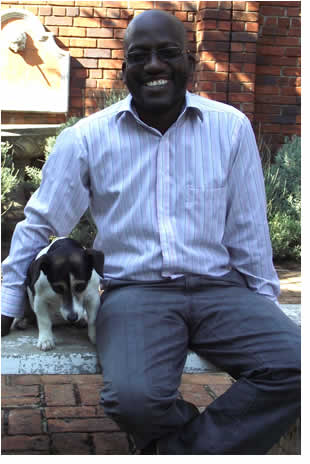|
Back to Index
"I'm
changing the world through my music" - Interview with educationist
Colbert Mpofu
Upenyu
Makoni-Muchemwa, Kubatana.net
June 02, 2011
Read
Inside/Out with Colbert Mpofu
 Listen to the HIFA Festival Singers
directed by Colbert Mpfou
Listen to the HIFA Festival Singers
directed by Colbert Mpfou
 Colbert
Mpofu is a classical musician and educationist. He has served as
headmaster of several Zimbabwean schools, and on the executive committee
of Musicamp. He is passionate about promoting tolerance and is changing
the world through his music. Colbert
Mpofu is a classical musician and educationist. He has served as
headmaster of several Zimbabwean schools, and on the executive committee
of Musicamp. He is passionate about promoting tolerance and is changing
the world through his music.
Why
did you choose classical music?
I had a rich childhood in terms of who I am and how I grew up. Like
most people my age I grew up in a high-density area in Bulawayo.
It was segregated in terms of race. At the same time, amongst blacks,
it was also divided in terms of Zimbabweans and Malawians, and amongst
Zimbabweans it was divided according to class. The teachers and
the nurses stayed in one area, and the factory works in another
place. I grew up in a small and very privileged neighbourhood in
Mpopoma South. Both my parents were teachers. Our primary school
was very well funded - it had a music department. My music teacher,
Mr Chuma, was very well trained he taught us to play recorder, piano
and guitar. By the time I entered my teens I was already a musician.
When my parents returned from exile in Zambia they took me to a
music academy, and I started doing graded music exams. From there
I proceeded to the College of Music where I studied Musicology.
Through my teachers and instructors I have become the musician who
I am today. Throughout my life my father encouraged me in my studies.
But then he was a different man, he was a headmaster . . . I sometimes
regret that he didn't live to see me now. He bought me my
first guitar while I was in primary school. I still have it today.
What
is Musicamp?
Musicamp is an association that was started by music teachers
about fifty years ago. It started in Bulawayo, where they would
take music students for one week and rehearse a classical piece
then and then hold a performance. There's a Jazz Band, a string
orchestra, a choir and the Symphony Orchestra itself. It's
found a permanent place at Peterhouse Girls School, and it happens
every year in August. I started going when I was nine, and then
carried on into adulthood. It's a wonderful experience of
meeting all the young classical musicians and it builds us as a
community.
What
would you say is your most enriching experience with regard to music
and teaching?
The two are complimentary. Working in schools you reach out to children
and very often music teachers are not that celebrated. They only
think about you when it's Christmas or Easter or speech day,
unless there's a Headmaster who creates space for the expressive
arts in schools. I was lucky in that I taught at schools where music
was appreciated, and that had good music departments. As a headmaster
I was able to create space for music, as well as drama, theatre
and fine arts in schools. I found that when children became comfortable
with the arts, that influence also went to their parents, and then
it goes to the community. I would also be sensitive about what music
I teach and what values it imparts.
Do you
think there is enough space for the arts in our educational curriculum?
Yes and no. Independent schools that are self-funded or funded by
parents have very strong music departments, and then we've
got public schools who also have strong departments. The problem
is that these schools tend to focus on one type of music: Jazz,
Pop, Choral, or Classical. Very few are able to provide students
with a wide range of musical influences. There is a lot of scope
to develop further. We don't have a conservatory in this country
and the college of music tends to teach a single genre.
How
did you get involved with HIFA?
I knew Manuel for many years before the Festival. We played in youth
Orchestras together. He was a pianist and I played in the symphony.
I knew him as a fellow musician. One day he arrived at the college
of music carrying a yellow plastic folder with two or three pages.
We sat on the steps of the college and he said ‘you know what,
I've got this idea, have a look at it. Do you think it will
work?' It was a very skimpy proposal for what was to become
HIFA. Since then my involvement has been in areas of the Festival
where I'm needed. This year I conducted the Festival Choir.
How
are you changing the world?
Being a classical musician has been a very conscious decision. If
there was an ambassador of tolerance I'd like to be one. Being
a black Zimbabwean playing and singing classical music, you never
get coverage in the papers. We have so many breakthroughs but nobody
sees them. I'm changing the world through my music. When we
have performances I'm often the only black person. I want
to get people to think about it, to see that black people can make
good classical musicians.
Visit the Kubatana.net
fact
sheet
 Audio Files
Audio Files
These pieces
are what Colbert Mpofu rained and conducted for this year's Opera
Gala at HIFA as the director of the Festival Singers.
Please credit www.kubatana.net if you make use of material from this website.
This work is licensed under a Creative Commons License unless stated otherwise.
TOP
|

